From all the police check points and searches, one would think that I
was trying to get into the US embassy in Kenya. But all I really wanted
to do was to get out of Ecuador and make my way down to Piura, Perú. I
had wanted to fly direct to Lima, but as is the case all through South
America, any flight which crosses an international border ends up being
three times as expensive as a domestic flight of equal length, so I needed
to cross the border by bus.
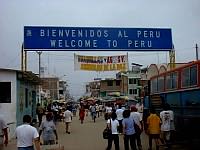 As we
made out way to the border, it seemed like every couple of hours we would
have to pull over, file out of the bus, get searched, then file back in.
I'm not entirely sure what they were looking for, but no one even blinked
at the switchblade knife and pepper spray that I had started carrying in
response to my not so welcoming greeting in Managua. You probably need a
semi-automatic weapon before they even start to get suspicious.
As we
made out way to the border, it seemed like every couple of hours we would
have to pull over, file out of the bus, get searched, then file back in.
I'm not entirely sure what they were looking for, but no one even blinked
at the switchblade knife and pepper spray that I had started carrying in
response to my not so welcoming greeting in Managua. You probably need a
semi-automatic weapon before they even start to get suspicious.
Of course, the laxity in the third world proved very helpful when it
came time to get my bike on the plane in Piura. Arriving 45 minutes before
a flight with no ticket and a fully assembled touring bike would get you
laughed out of any US airport, but the folks in Piura not only let me on
the plane, they gladly loaded on my bicycle, after wrapping it in a
quiltwork of scraps of cardboard, paper, and flattened boxes, barely held
together with tape. On any US airline, a carefully boxed bike usually
comes off the baggage carousel looking like it has been attacked by rabid
dogs, but my manky bundle of box pieces and tape showed up in Lima without
a single flap of cardboard out of place.
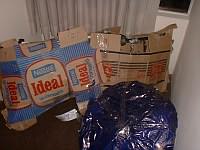 Lima was a city of pure chaos. The largest in South America,
its sprawling suburbs, countless plazas, and frenzied transportation system
were too much for me to wrap my mind around. In my three days there, I
never felt even slightly oriented. Having lost my guidebook (with
accompanying map) in Ecuador, I threw myself at the mercy of a local cab
driver, with instructions to take me to a cheap traveler's hostel close to
downtown. What I ended up with could hardly be called either cheap or a
traveler's hostel, but, not left with many options, I took it anyway.
Lima was a city of pure chaos. The largest in South America,
its sprawling suburbs, countless plazas, and frenzied transportation system
were too much for me to wrap my mind around. In my three days there, I
never felt even slightly oriented. Having lost my guidebook (with
accompanying map) in Ecuador, I threw myself at the mercy of a local cab
driver, with instructions to take me to a cheap traveler's hostel close to
downtown. What I ended up with could hardly be called either cheap or a
traveler's hostel, but, not left with many options, I took it anyway.
My time in Lima was purely business. I needed to find a lung doctor,
buy a ticket home, send some more photos home, and pick up an ATM card that
was sent to me to replace the one I had prematurely cancelled. Each errand
required being in a different district in the city, however, so I set about
trying to decifer the cryptic transportation system. Lima has no metro -
the entire transportation system consists of thousands of independently
owned mini-vans and buses which swoop down on potential passengers like
vultures to fresh kill. This survival of the fittest approach to
transportation guaranteed that only the most aggressive and psychotic
drivers survived. Each bus would have about a dozen names written on
front, and you just needed to know which name meant that the bus would pass
by your destination.
I soon got the hang of it, and started zipping around town to get my
chores done. The first priority was the doctor. Finding a doctor was as
simple as opening the yellow pages, flipping through the doctor listings
until I saw a picture of a lung, and calling. "Would you like an
appointment for right now, or this afternoon." If only the US had such
service.
The appointment confirmed what I had suspected - a lung infection had
reduced my lung capacity to 62%. It was good to have some medical
justification for my coughing and spluttering up hills. I was handed a
"prescription" for antibiotics and told all woudl be back to normal in a
week. A prescription in Perú is really just a recommendation from the
doctor, since you can walk into any pharmacy and buy anything you want
without any prescription, signature, or ID. Apparently they wanted to save
all the formalities for really imortant and dangerous things like trying to
send film out of the country. I not only had to sign a waiver declaring
that I was not sending any form of pornography, but I had to be
fingerprinted as well. I could almost see my life of crime unfolding ahead
of me. "Hello, is this the US Embassy?" "Yes." "Great, I need help. I'm
in prison and ..." "You didn't try sending any film, did you?"
I finished the rest of my chores as soon as possible, and off I went to
find a bus out of town. My errand focused stay had left me with absolutely
no understanding of the cultural or historical offerings of Lima, but I
didn't really mind.
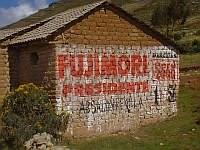 For even though I managed to avoid the
highlights of Lima, it was impossible to avoid the political turmoil that
had been brewing. Just as I was ready to leave, Alberto Toledo, the
opposition candidate in the upcoming elections, had withdrawn his
candidacy, claiming that the first round of elections was fraudulent, and
that nothing was going to save the next round from the same fate. It's
hard to disagree, seeing as there were more votes in the primary that there
were Peruvians. I managed to escape most of the major turmoil by heading
out of town.
For even though I managed to avoid the
highlights of Lima, it was impossible to avoid the political turmoil that
had been brewing. Just as I was ready to leave, Alberto Toledo, the
opposition candidate in the upcoming elections, had withdrawn his
candidacy, claiming that the first round of elections was fraudulent, and
that nothing was going to save the next round from the same fate. It's
hard to disagree, seeing as there were more votes in the primary that there
were Peruvians. I managed to escape most of the major turmoil by heading
out of town.
My destination was the Andean town of Huancayo, far from the fumes,
chaos, and riots of the ctiy. When I arrived at the bus station, three
buses were lined up to leave for Huancayo. I approached the one which
looked most likely to leave, but I was quickly told that there was no room
for my bike, and that I needed to board the next bus. I started loading my
bike on the second bus, but once I realized that it wasn't leaving until
after the first bus was entirely full, I decided to see if I could talk
them into squeezing me in. I boarded the bus to talk to the driver and
noticed that there were two people on board. It seemed unlikely that two
people had brought enough stuff to fill a 60 person bus. Another case of
basic laziness on the part of the driver.
I and the other two passengers were loaded and ready to go by 7pm, but
we weren't going to leave until more passengers showed up. After another
half dozen passengers arrived, the bus started to pull out of the station,
only to stop and back right back to where it had started. The driver
apparently wanted to create the impression we were leaving, so reluctant
passengers would rush to get on. The driver contined this ruse for the
next two hours, and each time we surged forward, a few more passengers
would trickle on. The adjacent bus was doing the same thing, and it became
a battle to see who could get the most passengers. It wasn't until 9:30, 2
1/2 hours after I had boarded and when the bus was at capacity, that we
finally left for real.
I arrived in Huancayo at 6am, and the moment I stepped off the bus, it
was immediately apparent that I was in the mountains - the crisp, clean,
and icy cold air was a great relief after choking on diesel fumes in Lima.
Gone were the monstrous high rises and freeways of the city, replaced by
mud brick houses and dirt roads. Gone too was my relative anonymity which
I enjoyed in the big city - suddenly I was back to being a rolling freak
show.
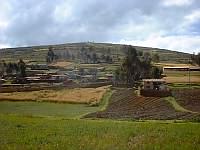 The temperature was near freezing as I stepped out into
the chilly air, so I quickly headed to the nearest hot food I could find,
which turned out to be a bowl of soup. Unfortunately, it was a bowl of
soup with a whole lamb's tongue floating in it. It had been ordered by a
friend I had met on the bus, so I didn't want to offend by not eating it.
The tongue itself was tolerable, but by the time I started gnawing through
the veins and connective tissue that were included in my choice cut, I was
having a hard time stomaching it. I decided that, etiquette or no
etiquette, I was not going to eat any more of that nasty knot of lamb's
tongue. I politely thanked my friend and the purveyor of the soup, and
quickly hopped on my bike, trying to put as much distance as possible
between me and the gris(t)ly remains of my abandoned meal.
The temperature was near freezing as I stepped out into
the chilly air, so I quickly headed to the nearest hot food I could find,
which turned out to be a bowl of soup. Unfortunately, it was a bowl of
soup with a whole lamb's tongue floating in it. It had been ordered by a
friend I had met on the bus, so I didn't want to offend by not eating it.
The tongue itself was tolerable, but by the time I started gnawing through
the veins and connective tissue that were included in my choice cut, I was
having a hard time stomaching it. I decided that, etiquette or no
etiquette, I was not going to eat any more of that nasty knot of lamb's
tongue. I politely thanked my friend and the purveyor of the soup, and
quickly hopped on my bike, trying to put as much distance as possible
between me and the gris(t)ly remains of my abandoned meal.
As I rolled away from the outskirts of town and into the countryside, a
wave of awe rolled over me, as I pedaled my way into the mostly uninhabited
vastness of the Andes. The area was remote and untraveled, and the roads
reflected it. All dirt, rocks, and potholes, my body was rattled to the
core. As I began the long series of climbs, I felt another wave
approaching, a wave of nausea, and soon I was at the sie of the road,
vomiting out the chunks of lamb tongue that my stomach had summarily
rejected. My queasiness soon went away, but the poor roads and climbing
did not. Perú was quickly surpassing Guatemala for the worst roads in
Latin America, an honor not easily earned.
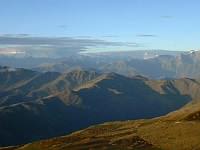 It
was, however, also quickly gaining on Colombia for the nicest people in
Latin America. Almost every time I would stop, even if only to ask
directions, I would inevitably find myself deep in conversation. It got to
the point that I would almost be spending more time talking during the day
than biking.
It
was, however, also quickly gaining on Colombia for the nicest people in
Latin America. Almost every time I would stop, even if only to ask
directions, I would inevitably find myself deep in conversation. It got to
the point that I would almost be spending more time talking during the day
than biking.
That evening, my biking spirit bruised from hours of torturous roads, I
stopped at the only village I could find, named Mejorada. Luckily, there
was one, albeit bare bones, accomodation in town. I took my shower
quickly, before the heat of my body from biking was robbed by the cold of
the night. Once night fell, there was no way I was going to pour cold
water on myself. The village had no electricity that evening, so,
flashlight in hand, I walked to the one and only restaurant. Once again,
the Peruvian amicability kicked in, and I found myself not only talking
with the owners, but also with the owner's kids, a couple of other kids who
had wandered in, and the other two patrons in the restaurant, a young
couple apparently on a date. We talked about everything from the cost of
living in each of our countries to politics to food, until I eventually
found myself giving the children English lessons by candlelight.
Back in my room, buried deeply in a pile of blankets to keep warm, I
discovered one of the unfortunate side-effects of the medications I had
been given for my lungs; apparently, Zithromax is a diuretic, and I found
myself having to get up half a dozen times in the night, which is bad
enough in the best of times, but the bathroom was outside, in the cold,
down a creaky set of steps more reminiscent of a ladder, and inside a tiny
room, no larger than a closet, with no lights. The "toilet" was just a
hole in the floor in a tiny corner, where the four foot ceiling
necessitated a full squat just to get in. Budget accomodations sometimes
have their disadvantages.
Continue to part 2

